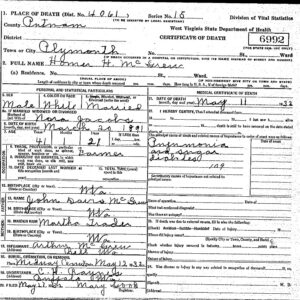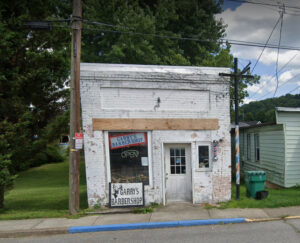After our conversation last night, I’m writing down what I recall and what I can discern from public records.
Homer and Nora Belle (Jacobs) McGrew were living at Glasgow in the 1920’s and 30’s. I know that both Henry & Clayton were born at/near Woods Station: that’s between Buffalo & Midway, WV (Putnam Co), directly across the Kanawha from Frazier’s Bottom. Henry was born 1910 and Clayton was born 1912. So, Henry met and married Violet in the Glasgow area in Aug 1931. As a matter of fact, the rest of Henry & Clayton’s siblings were born at Glasgow with Floyd, being the youngest, born 1930. I guess around that time, Homer and Nora moved back to Putnam County, likely to the Plymouth area because his death record shows he died May 1932 at Plymouth (COD: diabetes & pneumonia). I’m assuming Henry & Violet were still in the Glasgow area because in Nov 1932, they had a baby named Elaine Faith. It was a complicated delivery so she was a forceps baby: the doctor killed Elaine Faith trying to deliver her. The cause of death is given as “forceps delivery: bruised and crushed skull.” So, Henry lost his dad in May and his firstborn in Nov of that same year.

Clayt and Virgie married Dec 1934. All of their kids were born in the Bancroft/Poca area in 36, 38, and 40. (BTW, Bob was born in 32 so he was about 2 when Clayt and Virgie married). Clayt and Virgie remained in Putnam Co until at least 1950 because they’re listed in the Census that year. Come 1961, they’re listed in a City Directory in Mt. Vernon, OH.
While we (me and Gloria) cannot/could not locate a marriage record for Grandma (Nora Belle) and Mr. Hedrick, Gloria and Norma Lee put their heads together and came up with a marriage of 1935 in Gallia Co, OH but it had to have been before August. This is because Grandma and Jim Hedrick took Norma Lee to stay with Henry and Violet in Eureka, OH: Henry was working for (Drago?) building dams/locks, pouring concrete, etc. (I understand that he was the only man that would walk the narrow beam out in the middle of the river). Norma Lee told that during that visit, Violet let her feel her belly, to feel the baby kick, and told Norma Lee she was pregnant. Dad’s sister Alice Ann was born at Eureka in Gallia County, OH in August 1935. Henry & Violet moved around quite a bit. Come May 1936 Violet is back in Glasgow where Alice Ann died in May 1936: She’d been diagnosed with Diptheria and died of pneumonia. But in ’39, they were in Circleville, OH where Dad was born.
So, I would agree that Clayt was the “stand in” father to his younger siblings, in the very least until Grandma married Jim Hedrick, because Henry was gone and away quite a bit until 1940: After Dad was born, I think Violet put her foot down and wanted to be near her family. Henry went to work for Union Carbide: The 1940 Census of Kanawha County says he was a Carpenter for the Chemical industry so I assume they were back in the Dunbar area to stay.
Nora Belle and Jim Hedrick are listed in the 1940 Census living in the Poca District (I assume on Manila Creek) with Doc, Fred, Gloria, and Floyd in the household. Norma Lee had married Bob Tucker in 1939 on Manila Creek: She was 16 so she’s not listed with Grandma and Jim Hedrick. Jim Hedrick was a “peddler:” I was told that Grandma raised the vegetables, he sold them house to house. At some point, Grandma ran a restaurant/truck stop in Poca (it is now a barber shop on the main street between the Middle School and the Funeral Home). And apparently, she was very good – renowned, you could say: Even Mom has commented on the number of trucks parked on the road in Poca at lunch time (the Middle School used to be the High School).
In 1950, Floyd is the only child still in the home with Grandma and Jim Hedrick. He is 19, occupation truck driver. Jim Hedrick died in 1955 at Poca. I can only assume Grandma moved down to Hometown after that. I remember being at the house a couple of times. She had an enormous Lilac bush in the backyard that I adored – purple has been my favorite color ever since. Floyd and Geneva lived across the road from her. I remember Sheila and one of the boys being outside playing then later we heard that Randy had been burned playing in what I assume was the burn barrel near the house.
When I was 8, Dad accepted a job as preacher at a church in Fayette County, WV and we moved up into the mountains. We were back to Bancroft and Dunbar several times a year to visit but cousins were getting married and moving out and we more or less lost touch (except on my mom’s side of the family). Dad would go to Uncle Fred’s and Betty’s but I didn’t always go with him. And we’d stop and visit Doc and Elsie now and again. Billy Joe was married to Penny and lived at Henry’s house on the farm at Bancroft, I suppose after they first married: He’d been to Vietnam, saw action, and I remember him showing Dad a bullet wound in the fleshy underside of his arm.
There’s more but this will do for now, I think. Hope this helps with the stories your Dad told.

